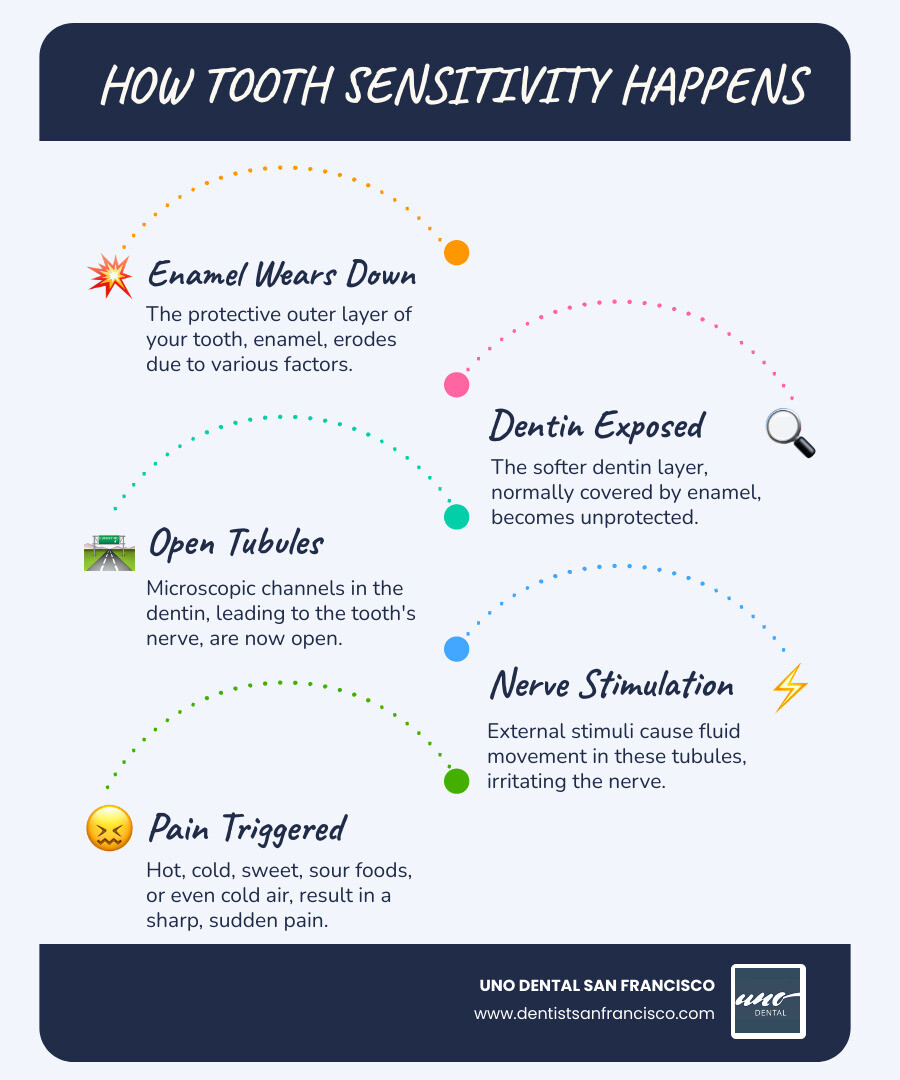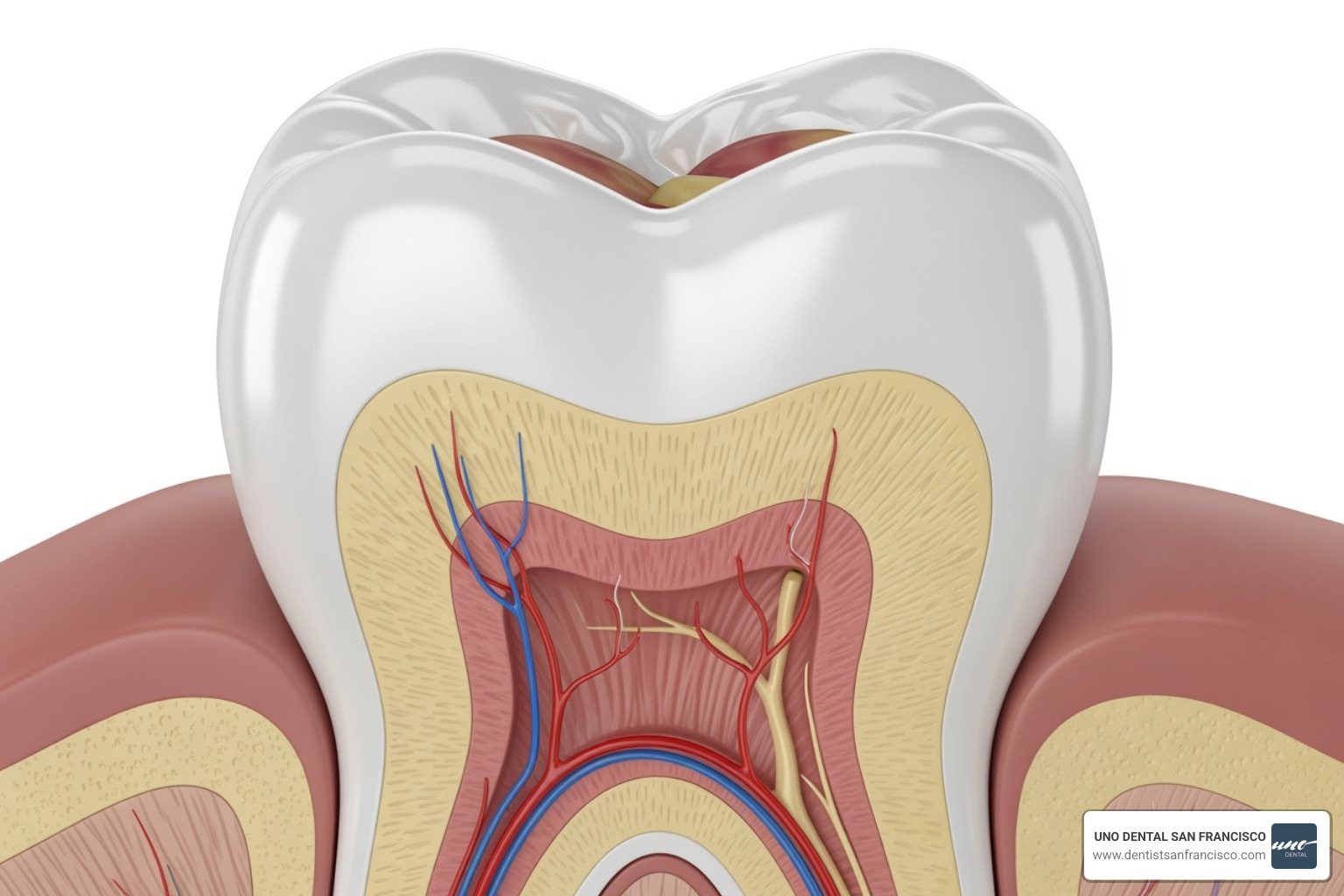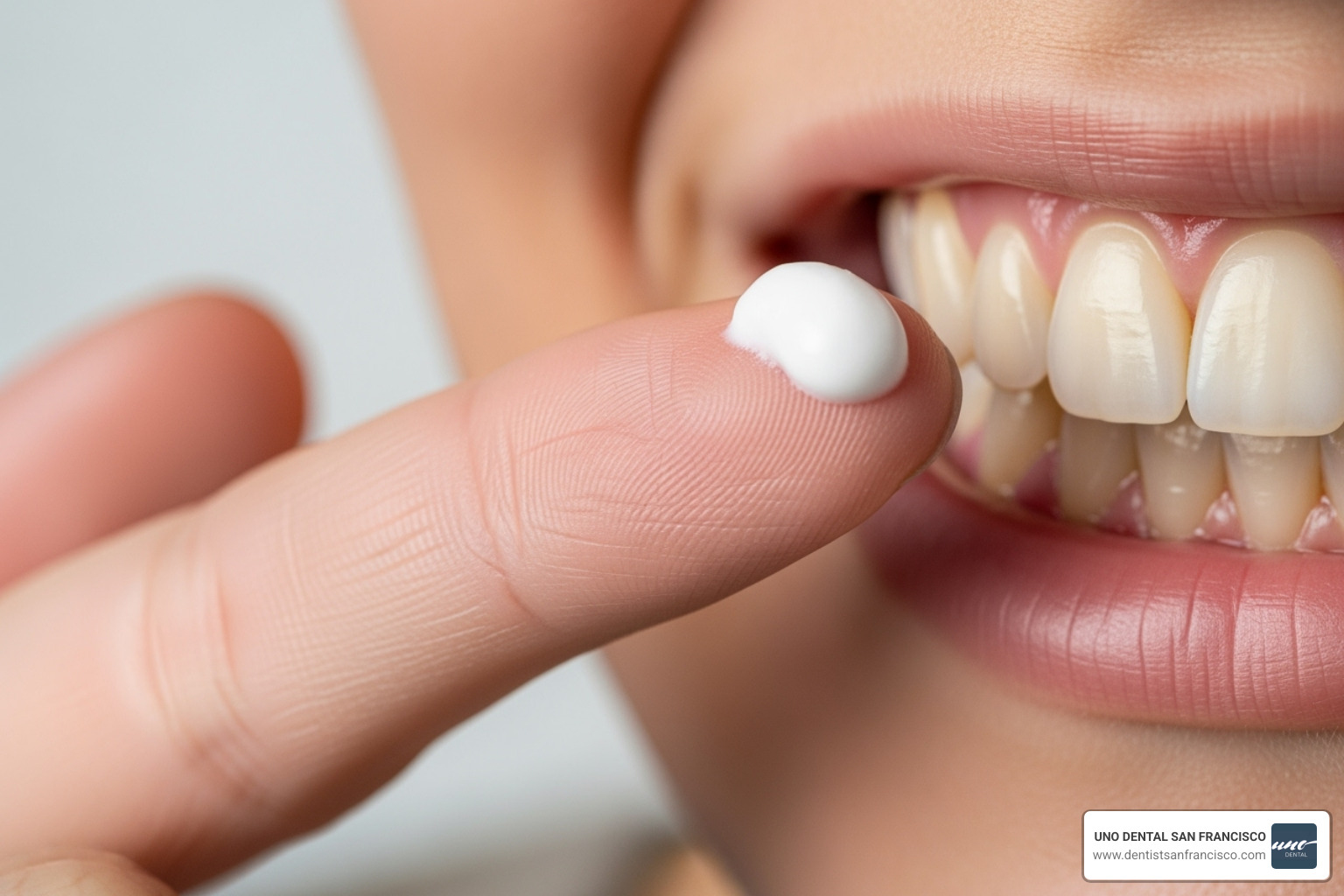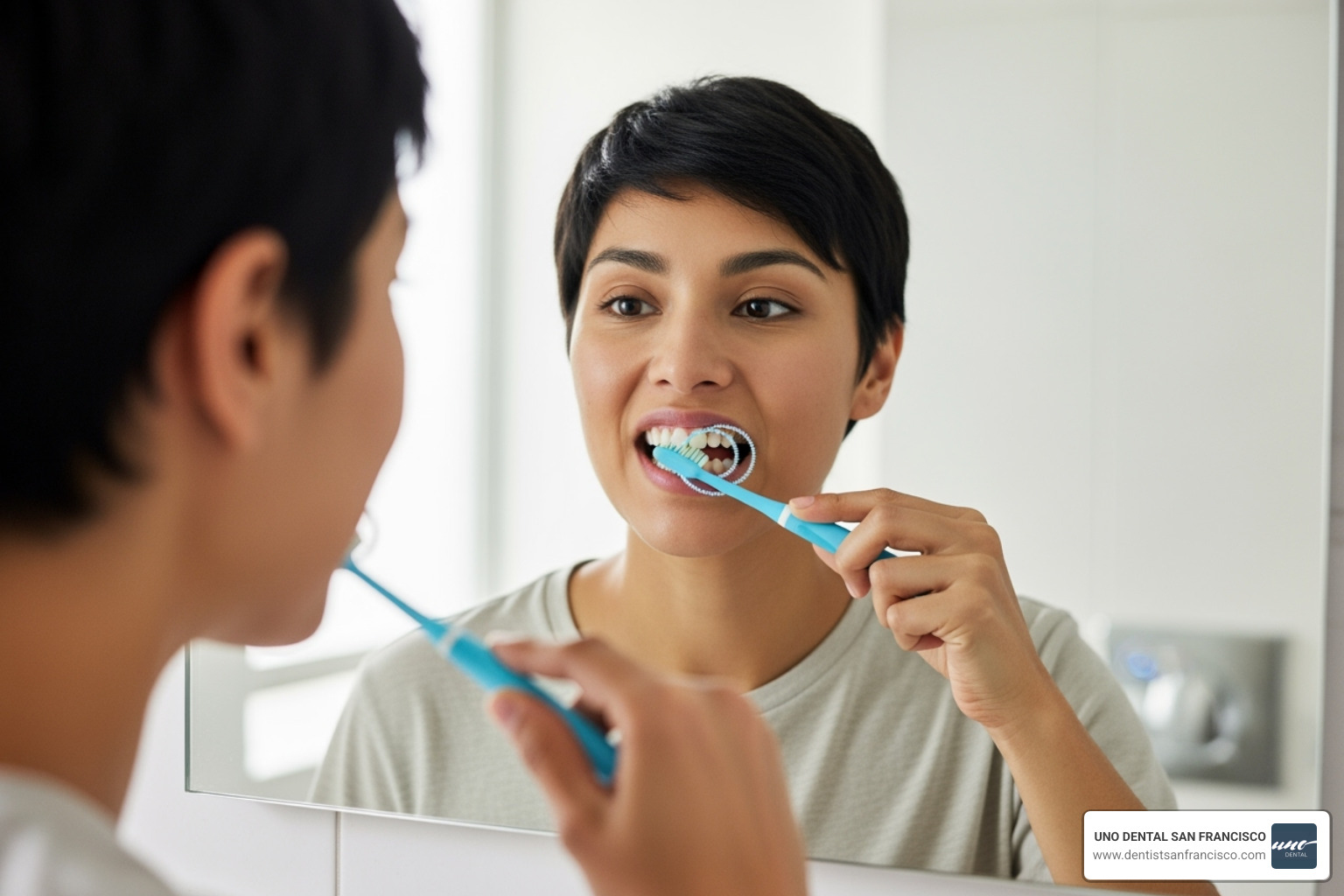
Why Tooth Sensitivity Shouldn't Control Your Life
Medically reviewed by Mohammad Aghiad Kandar, DDS (UNO DENTAL SAN FRANCISCO)
Stop teeth sensitivity with the right combination of at-home care and professional treatment. Here's what works:
Quick Relief Methods:
- Apply desensitizing toothpaste directly to sensitive areas
- Rinse with warm salt water to reduce inflammation
- Use fluoride mouthwash to strengthen enamel
- Avoid extremely hot or cold foods temporarily
- Apply a cold compress if swelling is present
Long-Term Solutions:
- Switch to a soft-bristled toothbrush and brush gently
- Use toothpaste with potassium nitrate or strontium chloride
- Limit acidic foods and drinks
- See your dentist for fluoride varnish, dental bonding, or sealants
- Address underlying issues like gum recession or teeth grinding
That sharp, sudden pain from cold water or sweet foods is tooth sensitivity. It affects millions when protective tooth enamel wears down, exposing the softer dentin layer underneath. This layer contains tiny tubes leading to the tooth's nerve, which is why temperature and certain foods trigger discomfort.
The good news is that sensitivity is treatable. Whether caused by aggressive brushing, gum recession, acidic foods, or teeth grinding, there are proven ways to stop teeth sensitivity. Some cases need simple routine changes, while others require professional help to address the root cause. Understanding the trigger is the first step toward relief.
As Mohammad Aghiad Kandar DDS at UNO DENTAL SAN FRANCISCO, I help patients stop teeth sensitivity with personalized treatment plans. My approach identifies the underlying cause to provide both immediate relief and long-term protection.
Understanding Tooth Sensitivity: What's Causing the Pain?
That sudden jolt of pain is your tooth telling you something. Tooth sensitivity, or dentin hypersensitivity, occurs when the protective enamel wears down or gums recede, exposing the softer layer underneath called dentin.
Dentin is filled with thousands of microscopic tubules that lead directly to your tooth's nerve. When triggers like hot coffee or cold air reach these exposed tubules, the sensation travels to the nerve, causing sharp pain. Understanding this is key to figuring out how to stop teeth sensitivity for good.
Common Causes of Enamel Wear and Root Exposure
Several habits and conditions can gradually wear down enamel, leaving teeth vulnerable.
-
Aggressive brushing: Scrubbing too hard, especially with a hard-bristled brush, wears away enamel and gum tissue, exposing sensitive root surfaces.
-
Abrasive toothpastes: Some whitening or tartar-control toothpastes are too harsh and can damage enamel over time.
-
Gum recession: When gums pull away from teeth due to harsh brushing, gum disease, or genetics, the unprotected roots are exposed. Our guide on Could You Have Gum Disease? can help you spot the signs.
-
Teeth grinding (bruxism): Clenching or grinding, often during sleep, wears down enamel and can create tiny cracks in teeth.
-
A cracked tooth: An injury or biting on something hard can create a direct pathway for triggers to reach the nerve.
-
Acidic foods and drinks: Items like citrus, soda, and sports drinks gradually erode enamel with repeated exposure.
-
Recent dental procedures: Sensitivity after fillings, crowns, or cleanings is common and usually temporary, fading within a few weeks.
-
Teeth whitening products: Bleaching agents can temporarily make teeth more reactive. We can discuss safer, professional options to whiten your teeth without increasing sensitivity.
Recognizing the Symptoms of Sensitive Teeth
Sensitive teeth typically announce themselves with a sharp, sudden pain that fades quickly once the trigger is removed. This is different from a persistent toothache caused by decay or infection.
Pay attention to your triggers, as they are the biggest clue. Common triggers include:
- Hot foods and drinks (coffee, soup)
- Cold foods and drinks (ice cream, ice water)
- Sweet or sour foods
- Cold air inhaled through the mouth
- Pain during brushing or flossing
While these symptoms often point to sensitivity, they can sometimes signal a more serious issue like a cavity. It's important not to ignore persistent pain. The sooner we identify the cause, the faster we can help you stop teeth sensitivity.
Immediate Relief: At-Home Remedies for Tooth Pain
When sensitivity strikes, you need relief fast. While these at-home methods won't permanently stop teeth sensitivity, they offer excellent immediate pain management while you address the underlying cause.
How to stop teeth sensitivity pain right now
-
Warm saltwater rinse: Mix half a teaspoon of salt in a glass of warm water and swish for 30 seconds. Saltwater is a natural anti-inflammatory that can soothe irritated gums.
-
Direct application of desensitizing toothpaste: Squeeze a small amount onto your finger and gently massage it onto the sensitive tooth. Let it sit for a few minutes before rinsing for targeted relief.
-
Over-the-counter fluoride rinse: Use an alcohol-free fluoride rinse after brushing to help strengthen enamel and build resistance to triggers.
-
Avoid extreme temperatures: Give your teeth a break by sticking to lukewarm or room-temperature foods and drinks for a few days.
-
Cold compress: If you have swelling, apply an ice pack wrapped in a towel to the outside of your cheek for 10-15 minutes to numb the area.
Best Toothpastes and Mouthwashes for Sensitive Teeth
Choosing the right products is crucial to stop teeth sensitivity. Look for specific active ingredients designed to tackle the problem.
-
Potassium nitrate: This is the most common ingredient and works by blocking pain signals from the tooth's nerve to the brain. Consistent use (twice daily) typically brings improvement within two weeks.
-
Strontium chloride: This ingredient works by physically blocking the tiny tubules in your dentin, preventing sensations from reaching the nerve.
-
Stannous fluoride: This multi-tasking ingredient strengthens enamel while also forming a protective barrier over exposed dentin for both immediate and long-term relief.
When shopping, always choose non-abrasive formulas labeled "for sensitive teeth." Avoid harsh whitening or tartar-control products that can worsen sensitivity. For mouthwash, select an alcohol-free fluoride formula to avoid irritation and get the full enamel-strengthening benefits.
At UNO DENTAL SAN FRANCISCO, we believe proper at-home care is foundational. For more guidance, see our guide on best dental hygiene practices.
Long-Term Strategies to Stop Teeth Sensitivity for Good
Quick fixes are helpful, but lasting changes can stop teeth sensitivity for good. At UNO DENTAL, we focus on a comprehensive approach that combines prevention, enamel protection, and smart lifestyle choices to eliminate the conditions that cause sensitivity in the first place.
Perfecting Your Oral Hygiene Routine
Your daily habits can either cause or prevent sensitivity.
-
Use a soft-bristled toothbrush: This is non-negotiable. Hard bristles wear away enamel and irritate gums. An electric toothbrush with a pressure sensor is an excellent tool to ensure you're brushing gently.
-
Master your brushing technique: Instead of aggressive scrubbing, use small, circular motions to gently massage your teeth and gums. Proper technique is essential for preventing enamel wear and gum irritation.
-
Floss daily: Flossing removes plaque from between teeth, preventing the gum inflammation and recession that lead to sensitivity.
-
Schedule regular dental checkups: These visits are your secret weapon. We can spot early signs of wear or recession and apply professional fluoride treatments. Preventive Dentistry San Francisco is the best way to stop sensitivity before it starts.
The "Anti-Sensitivity" Diet: Foods to Eat and Avoid
Your diet directly impacts your enamel. To stop teeth sensitivity, be mindful of what you eat and drink.
Avoid acidic and sugary items, which soften and erode enamel. Key culprits include carbonated drinks, citrus fruits, tomato sauces, wine, and coffee. Sugary drinks also feed acid-producing bacteria.
Choose enamel-strengthening foods. Dairy products like milk and cheese help remineralize enamel. High-fiber fruits and vegetables like apples and carrots stimulate saliva, which neutralizes acid. Drinking plenty of water, especially after meals, rinses away acids and food particles. For more ideas, check out our article on Thanksgiving Foods for Healthy Smiles.
| High-Acid Foods/Drinks | Low-Acid Foods/Drinks |
|---|---|
| Citrus fruits, juices | Milk, cheese, plain yogurt |
| Carbonated sodas | Water |
| Tomatoes, tomato sauce | Leafy greens (spinach, kale) |
| Pickles, vinegar | Lean proteins (chicken, fish) |
| Coffee, black tea | Apples, carrots, celery |
| Wine | Whole grains |
Lifestyle Adjustments to Protect Your Teeth
Small changes can make a big difference.
-
Use a straw: When drinking acidic beverages, use a straw positioned toward the back of your mouth to minimize contact with your teeth.
-
Rinse, don't brush, after acid: After consuming acidic foods, rinse your mouth with water. Wait at least 30 minutes before brushing, as your enamel is temporarily softened and vulnerable to damage.
-
Address teeth grinding (bruxism): If you grind your teeth, a custom-fitted mouthguard worn at night can prevent enamel wear. We can create a comfortable one for you.
-
Manage acid reflux: Stomach acid is highly corrosive to teeth. Managing GERD with your physician is crucial for protecting your enamel. If you also have jaw pain, our TMJ Treatment San Francisco can address related issues.
When to See a Dentist: Professional Treatments for Lasting Relief
When at-home efforts aren't enough and sensitivity persists, it's time to see a professional. At UNO DENTAL, we focus on diagnosing the root cause of your pain, as persistent sensitivity can signal a deeper issue. Ignoring ongoing discomfort can lead to more serious problems, so if you're in severe pain, our Emergency Dentist San Francisco services are available.
Signs You Need Professional Dental Help
It's time to schedule an appointment if you experience any of the following:
- Constant pain that lingers after a trigger is gone.
- Sensitivity concentrated in one specific tooth, which may indicate a cavity or crack.
- Pain when biting down, suggesting a cracked tooth or loose filling.
- Swollen or bleeding gums, which are signs of gum disease.
- A visible hole or crack in your tooth.
These symptoms can point to issues like cavities or gum disease that require professional care. Our guide on How to Tell If You Have Dental Cavities can help you recognize the signs.
Advanced options to stop teeth sensitivity
We offer a range of professional treatments to provide lasting relief.
-
Fluoride varnish: A high-concentration fluoride treatment is applied directly to sensitive areas to strengthen enamel and dentin, blocking the pathways to the nerve.
-
Dental bonding: For exposed roots, we apply a tooth-colored resin to cover and protect sensitive surfaces. Learn more on our Dental Bonding San Francisco page.
-
Dental sealants: These are thin, protective coatings applied to the chewing surfaces of back teeth to shield against sensitivity and decay.
-
Gum graft: If significant gum recession is the cause, this procedure covers exposed roots, reducing sensitivity and protecting against further recession.
-
Root canal: In severe cases involving infection or damage to the tooth's pulp, a root canal removes the source of the pain, saving the tooth. Modern root canals are a comfortable and effective procedure.
Our approach at UNO DENTAL is to find the source of your discomfort and create a custom treatment plan. Explore our Restorative Dentist Complete Guide to learn more about how we restore dental health and comfort.
Frequently Asked Questions about Tooth Sensitivity
We hear these questions every day in our San Francisco office. Here are the answers you need to stop teeth sensitivity.
How long does it take for desensitizing toothpaste to work?
Desensitizing toothpaste requires consistent use. Most people notice a significant difference within about two weeks of brushing twice daily. The active ingredients, like potassium nitrate or stannous fluoride, need time to either block pain signals or build a protective barrier over exposed dentin. Daily use is essential to build and maintain this protection.
Can tooth sensitivity go away on its own?
It depends on the cause. Sensitivity from a recent dental cleaning or whitening treatment is often temporary and will fade on its own. However, persistent or worsening sensitivity usually indicates an underlying issue like enamel erosion or gum recession that requires treatment. It's crucial to get a professional diagnosis to rule out more serious problems like cavities or cracks and find the right solution.
Is tooth sensitivity a sign of a serious problem?
It can be. While often manageable, sensitivity can also be a warning sign for cavities, gum disease, or a cracked tooth. These issues expose the sensitive inner layers of the tooth and require professional treatment. This is why regular checkups are so important—we can diagnose the root cause of your pain and determine the right course of action. Don't ignore persistent sensitivity; let us help you find the cause. You can learn more about the connection between oral and overall health in our article on What Your Teeth Say About Your Overall Health.
Conclusion
You don't have to live with the sharp pain of sensitive teeth. By understanding the causes and taking action—from adjusting your daily habits to seeking professional treatment—you can stop teeth sensitivity and enjoy life without worrying about pain.
The journey to relief starts with small, consistent steps like switching to a soft toothbrush or being mindful of acidic foods. Sometimes it requires advanced solutions like fluoride varnish or dental bonding. Whatever your situation, there is a path forward.
At UNO DENTAL, our approach combines advanced technology with genuine care for your long-term oral health. Dr. Mohammad Aghiad Kandar and our team will identify the root cause of your sensitivity and create a personalized treatment plan for lasting relief, not just a temporary fix.
Your smile should bring you joy, not discomfort. Ready to stop teeth sensitivity for good? Take the first step toward a pain-free smile by scheduling a consultation to discuss our preventive and restorative solutions. We'll work with you to find lasting relief and help you regain the simple pleasure of eating and drinking without hesitation.
Reviewed by: Mohammad Aghiad Kandar, DDS (UNO DENTAL SAN FRANCISCO). Manual review completed.



